HTTP Session Management
Problem
HTPP is a sessionless protocol. Each GET request is handled by
- Open a connection to the Web server
- Download the document
- Drop the connection
This is expensive for multi-document pages such as those with image
or frames: each URL is handled by a separate request.
HTTP 1.1
HTTP 1.1 attempts to solve some problems caused by this
- An open connection may be kept open instead of closed
- Requests from the same browser may reuse this connection
instead of starting another one
- The connection is closed after a short period of inactivity
e.g. 30 seconds
- This can double transfer times for some pages
- It doesn't answer the session management problem
Session management
- Applications maintain state
- Distributed applications may maintain state in each
distributed component
- Web applications are expected to maintain state
- Typical Web application: shopping cart, where the server is
expected to keep a list of items in the cart, and present this
list on demand
- Web support for state is poor
Stateful server
In a client-server application, the server may keep state information
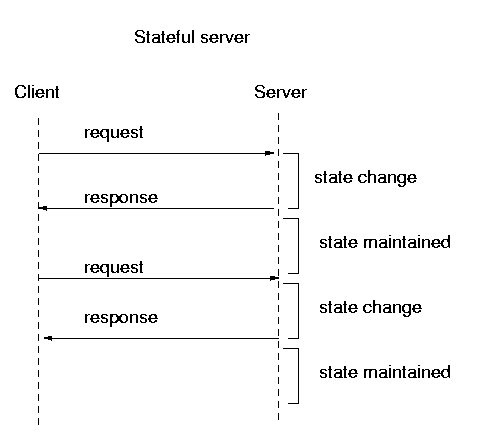
Stateless server
In a client-server application, the server may be stateless, with the
client keeping state
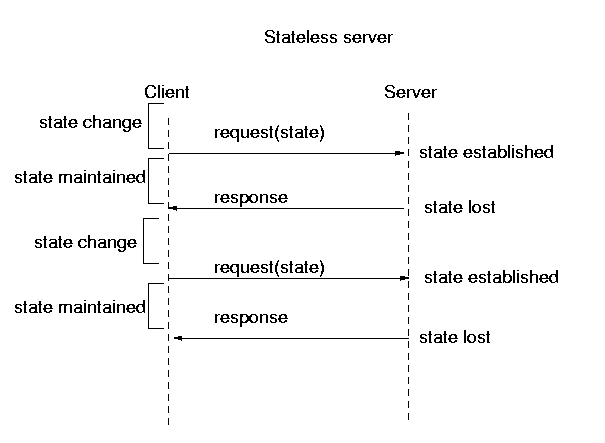
Static Web documents
Neither side needs to keep state - HTTP 1.0 is designed for this
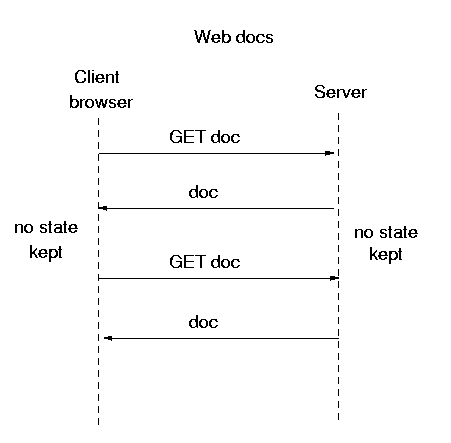
CGI Applications
- CGI applications run for the duration of an HTTP session
- State only exists for the lifetime of the CGI application -
the HTTP session
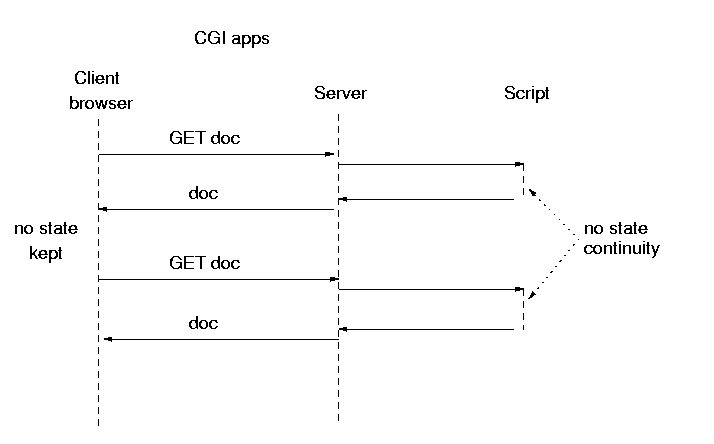
Web Applications
- State must be maintained across CGI applications
- Requires the browser to maintain state
information
- The browser cannot keep all of the server state - typically
it keeps and returns a key for the server
- The key should not contain sensitive information such as credit
card numbers
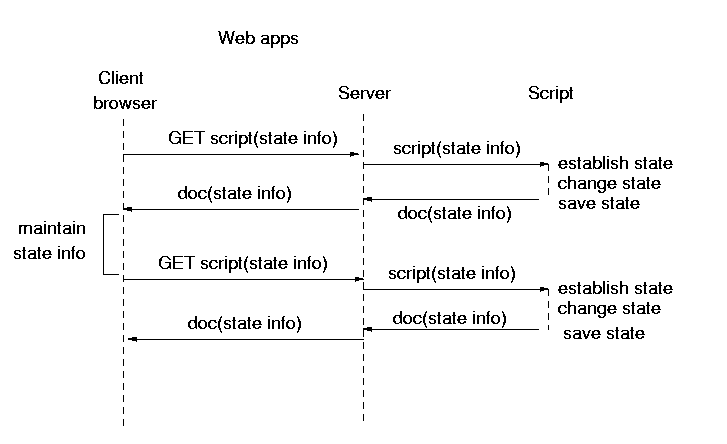
State information
A browser can keep state information in
- Cookies
- Hidden form fields
- URL rewriting
- Challenge/response
Cookies
- Cookie are passed at the HTTP layer
- HTTP format is
Set-Cookie: cookie-value
- Cookies are sent from the server to browser and returned
from browser to server
- Cookies have
- a lifetime
- a domain
- a flag to return on secure or non-secure channels
Passing cookies from server to browser
- Cookies will be passed on the wire in the HTTP header
- Cookies may be passed from an HTML document to the HTTP layer by
...
HTTP-EQUIV="Set-Cookie: ..."
- Cookies may be passed in a Perl
CGI object by e.g.
$cookie = $query->cookie(-name=>'sessionID',
-value=>'xyzzy',
-expires=>'+1h',
-path=>'/cgi-bin/database',
-domain=>'.capricorn.org',
-secure=>1);
Retrieving cookie from browser
Problems with cookies
- Some users turn off cookies for privacy reasons
- Cookies expire after a while
Hidden Form Fields
URL rewriting
- A URL for a script can look like
http://host/path/script/extra_info
The extra_info is a '/' separated set of fields.
-
Note that this is different to the typical script arguments of
http://host/path/script?extra_info
- The two can be combined
http://host/path/script/extra_info?even_more_info
- The stuff following the '/' is given in
PATH_INFO
- The stuff following '?' is given in
QUERY_STRING
- e.g. the request
http://localhost/cgi-bin/test-cgi/abc/def?ghi
gives
REQUEST_URI=/cgi-bin/test-cgi/abc/def?ghi
SCRIPT_NAME=/cgi-bin/test-cgi
PATH_INFO=/abc/def
QUERY_STRING=ghi
To use this, make the ACTION part of a Form include
the session key as the PATH_INFO e.g. (Perl)
print "<FORM ACTION=\"http://localhost/cgi-bin/test-cgi/abc/def\">";
Challenge/Response
- Refuse the HTTP request unless it is accompanied by a
valid user id/password pair
- Then the
REMOTE_USER_AGENT environment variable
will contain the user id of the user
- This will be covered later in Security
Challenge/Response Plus/Minus
- Only method to identify user completely
- From the user viewpoint,
- requirement to register with each new site
- same user id can't be used across all sites (may already be taken)
- different password rules on different sites
- an exploding mass of user ids and passwords linked to sites
Jan Newmarch (http://pandonia.canberra.edu.au)
jan@ise.canberra.edu.au
Last modified: Tue Aug 15 13:54:38 EST 2000
Copyright ©Jan Newmarch 




